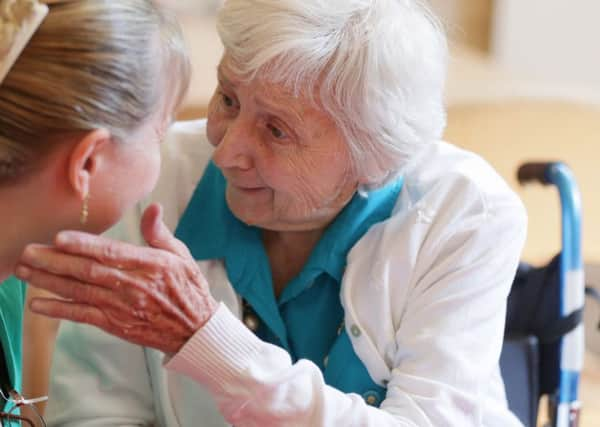Jayne Dowle: At Christmas, remember all those fated to forget it


It is feared that the ad dubbed “Santa Forgot”, voiced by Stephen Fry, is so disturbing that it can only be shown after the 9pm watershed. Father Christmas finds himself stuck at the North Pole, so confused he can’t remember which present goes to which child.
This animation won’t give anyone the same warm fuzzy feeling as a boxer dog bouncing on a trampoline. But it might make us all stop and think about a death which could befall, on current statistics, 11.6 per cent of us.
Advertisement
Hide AdAdvertisement
Hide AdIt is a terrible irony that in an age in which we have information at our fingertips from every angle, the biggest killer amongst us strikes at our memory and ability to retain and use just that.
According to those latest figures, last year more than 61,000 people died of dementia or its close cousin Alzheimer’s disease, in England and Wales. This means that it has overtaken heart disease as the leading cause of death in the country. Interestedly, it is far more likely to kill women than men, chiefly because women tend to have longer lifespans overall.
It’s not a nice thought, but the rise in the condition is due in part to the fact that we are all living longer. And thanks to modern medicine, we are surviving conditions which in a previous age might have killed us. The amazing advances in treating certain cancers and heart conditions have brought longevity to many who would have otherwise passed away in their fifties and sixties.
And yes, it’s true, this killer disease has been under the radar for so long not just because of the shame and misunderstandings about the symptoms, but because all too often it was dismissed as an inevitable effect of advancing age. Until recently, it was less likely to be recorded on a death certificate as the official cause of a death.
Advertisement
Hide AdAdvertisement
Hide AdThere are still so many myths to explode, but we can all do our bit. “Raising awareness” is often dismissed as a cliché, but with dementia it is vital. Let us use people power to bring this disease out of the shadows once and for all.
If your spouse, parent or grandparent is affected – as my grandma was – I don’t need to tell you that watching a person you love succumb to distress and confusion is heart-breaking.
I’ve seen it happen to many others, and talked to friends of all ages who have watched their partners and parents gradually succumb and slip away into a world of their own. It’s not just the dissolution of family bonds that hurts. It’s the lack of dignity a loved one has to endure that pierces the heart.
If an animal was as disoriented and disturbed as a person in the full throes of dementia, a humane solution to their suffering would be found. I am not qualified to debate the rights and wrongs of that here, nor would I wish to.
Advertisement
Hide AdAdvertisement
Hide AdRather, I would like to put out a plea to all who have the power to direct funding and research support towards finding treatment and medication which can help to put an end to this disease. Amazing strides have been made in the prevention of cancer, heart disease and diabetes in recent years. Every effort must be made by the government to help conquer a disease which is every bit as terrifying
No longer must we accept that “confusion” is an inevitable side-effect of advancing age. We must be alert to the signs of the onset of dementia and not be afraid to talk about them amongst ourselves.
It’s not that long ago that cancer was a taboo subject. Even 10 years ago, I remember a lady whose family were so ashamed that she was ill that they didn’t tell anyone except her very closest relatives. This poor lady passed away within weeks, leaving behind a devastated circle of friends who had no idea she was so sick and had no chance to offer her comfort.
If we can get over the fear of talking about cancer, surely we can approach dementia in the same way. That’s why Alzheimer’s Research UK is right to prick at our conscience with such a hard-hitting stance.
Advertisement
Hide AdAdvertisement
Hide AdIn the television commercial, a little girl called Freya mobilises Santa’s elves as scientists, telling them that research can find a way to fix his crippling and confusing condition. If only it really was that simple.
Dementia is a complex disease. It has common symptoms, but it strikes everyone in a different way. Many of those it affects won’t even know that Christmas is approaching. They might not even remember what Christmas is. This year, let us remember for them, and do all we can to back efforts to find a cure.